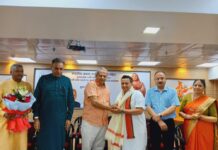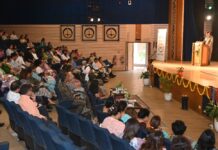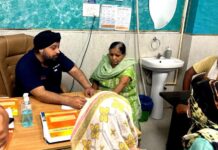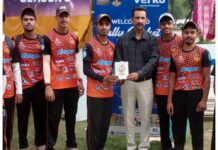Two Days VCs CONFERENCE on Implementation of NEP 2020 concluded Successfully at PU
The second day of the two-day Northern Zone Vice Chancellors Conference on the critical theme of “Implementation of NEP 2020,” at Panjab University began with the conduct of ten breakout thematic sessions covering holistically all the dimensions related to issues of implementation and challenges for NEP 2020. The recommendations proposed in all the thematic sessions were presented followed by the Q/A session at Law Auditorium, Panjab University.
The presentations were made by the group representatives to acquaint the participants about the deliberations happened during the respective session. Various recommendations on different dimensions of NEP were proposed were:
Thematic Group 1:Multidisciplinary and Holistic Education: Reforming the pedagogical activities, empowering teachers and evaluating their capacity for improvement of education.
Thematic Group 2:Digital and online Education:Quality content delivery especially in practical courses through simulation of experiments, virtual field visits, gamification, visualisationetc
Thematic Group 3:Skill Development and Employability:Alignment between demand and supply; collaboration with industry; start up culture and embedding technology and professional practices.
Thematic Group 4:Research, innovation and Entrepreneurship: Courses like entrepreneurship development within the curriculum and synchronization of these courses with semesters besides ensuring quality.
Thematic Group 5:Capacity Building of Teachers for Quality Education:Experiential learning and training through activities, case studies and hands-on practical work.
Thematic Group 6:Governance and Autonomy: Adequate resource allocation, policy alignment and long term vision, Flexibility and adaptability.
Thematic Group 7:Accreditation and Excellence:A centralized single portal for comprehensive collection of data merging all other portals like AISHE, UTSAH, NIRF, E-Samarth, NAAC and NBA, etc. and strengthening of Mentor-mentee system.
Thematic Group 8:Equitable and Inclusive Education:Affirmative action policy for SEDGs, Creating flexible admission criteria, Creating an inclusive curriculum that includes assessment and evaluation, and Creating skilling opportunities, especially for SDGs.
Thematic Group 9:Indian Knowledge System and Indian Languages:IKS courses/best practices related information developed by various HEIs should be available at one Platform which is to be created by UGC either as a separate portal or under its own Website.
Thematic Group 10:Internationalization:Increase functional and research collaboration, Running summer schools and Funding under CSR and from Alumni, Government etc.
The UGC chairperson, Prof. JagadeshKumar while taking up questions said that the universities/ HEIs should invite professors of practice who can help in designing courses as their inputs are vital. Further, he said that 5000 skill hubs will be set up across the country for providing skills to all so that dropouts become employable rather than skill-less graduates. He also highlighted that development of e-content in regional languages is also important. Moreover, he emphasized on the need of continuous feedback from students which is essential for the improvement of teachers. Digital empowerment through online learning was also one of the important agendas by the UGC Chairman who referred to e-Kumbh portal, a repository of UG course books in regional languages. He also emphasized on the need to create more material in the regional language. He advised that more digital content should be created for the benefit of students.
Apart from these sessions, a session on ‘Bharatiyabhashaayei’ was also conducted. The recommendations were made to equip teachers to use translation tools such as Anuvadini, Bhashiniand Udaan so that books for UG curriculum can be translated in regional languages. It was also proposed that rather than translating curriculum books, the emphasis should be on creating original content in regional languages only to retain the soul of the subject.
In another session, the UGC chairman interacted with 33 student ambassadors (NEP Saarthis) from 8 universities of Northern Region. He initiated the discussion by referring to the importance of freedom, choice and flexibility for the students. He responded to all the questions posed at him in a patient manner and encouraged them to engage with peers. It was followed by an interactive session with the print and electronic media.
UGC Joint Secretary Dr Avichal Kapurapplauded the efforts of Panjab University in hosting the conference. He summarized various initiatives being taken at the UGC level and urged VCs that the universities shall make clusters between themselves and give best opportunities to our learners.
All delegates unanimously agreed that efforts must be made by all the stakeholders to implement the NEP 2020 in true spirit.














